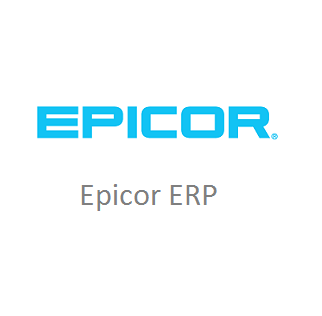Epi cor ERP Overview
cor ERP Overview
Status: Actively Maintained & Sold
Epicor ERP is the strategic, global ERP product from Epicor, one of the top ten ERP publishers in the world. Epicor ERP is designed for the SME space thousands of customers including many smaller SMB manufacturers. It is an extremely robust and scalable product designed for discrete manufacturers with deep industry features. Epicor ERP is sold through a mix of direct sales and authorized reseller channel.
With a long and rich history, Epicor ERP has been transformed in recent releases adding considerable functionality to close gaps in features available in Epicor’s legacy product portfolio. Priced competitively in the SME and upper SMB segment, Epicor ERP is a popular alternative to more expensive tier one applications like SAP and Oracle and a very strong application for more sophisticated SMB businesses that need more functionality than traditional accounting-focused vendors.
“We’ve been able to hit within 1 to 2 percent of budget estimates on standard equipment with our cost database in Epicor. We also finally have a good schedule in the shop, and know when raw materials will be needed.”
Epicor ERP History
 5 Principles of Epicor ERP: Simplicity, Mobility, Collaboration, Choice, and Responsiveness.
5 Principles of Epicor ERP: Simplicity, Mobility, Collaboration, Choice, and Responsiveness.
Epicor ERP was created from the Epicor Vantage code base. Vantage was originally developed for the Microsoft Windows platform in the mid-1990s by DCD Corporation in Minneapolis, MN. DCD was acquired by DataWorks of San Diego, CA in 1996. DataWorks merged with Platinum Software in Irvine, CA in 1998 and changed its name to Epicor in 1999. Vantage continued as one of the most innovative products in Epicor’s extensive portfolio.
Epicor introduced Epicor 9 (Epicor ERP) in October 2008. Epicor 9 is a completely new product formed out of the Vantage product line by updating the technology from Progress to Epicor’s ICE framework and completely redesigning and optimizing the system for Microsoft SQL Server. Epicor also bolstered the underlying financials and closed many of the feature gaps in Vantage in subsequent releases of Epicor ERP 9.05 and Epicor ERP 10.0 and 10.1. This was key as one of the knocks on Epicor Vantage was the relatively weak accounting modules.
Epicor leveraged the knowledge of their iScala development team in Sweden creating one of the most functional and global ERP products available on the market today.
It is worth mentioning that Epicor’s strategy is focused squarely on Epicor ERP. Each release has included features missing in the product that were available in other Epicor-owned products providing a migration path for customers on older Epicor products to eventually converge all customers on the Epicor ERP platform. This is no small task as Epicor owns many older systems including Vista, Enterprise, ManFact, DataFlo, InfoFlo, Avante, Manage 2000, and several other manufacturing-centric ERP systems.
Target Industries
Epicor ERP is developed primarily for discrete manufacturing with customers in other industries including process manufacturing, distribution, services, mining, and more. Target industries within discrete manufacturing are automotive and transportation, industrial products, metal fabrication, machinery and capital equipment, high tech electronics, medical device, plastics and rubber, primary metals, furniture, aerospace and defense, and non-metallic minerals.
Target Company Size
Epicor ERP is a bonafide SME ERP application for larger companies with multiple locations and global business requirements with up to about 5,000 employees or up to about $1 billion in revenue. Epicor ERP is also available in a cloud-deployed package (fka Epicor Express) which scales down nicely to much smaller SMB manufacturers with as few as 20 employees or as little as $1 million in revenue. The sweet spot for the product is certainly in the 100 to 1000 employee range with $20 million to $1 billion in revenue.
Technology
Epicor ERP is written in Microsoft .NET and Microsoft SQL Server. The product can be installed on premise or deployed as a completely hosted, multi-tenant application on Microsoft Azure or other private cloud providers. It scales well for businesses with over 1000 users down to businesses with as few as 3-5 users. Epicor’s ICE framework is truly revolutionary making it extremely easy to customize, personalize, and to integrate with third party applications.
Global Markets
Epicor ERP is a global ERP product available in more than 30 languages and used by thousands of companies in over 150 countries. The product is localized for international markets to ensure compliance with country-specific accounting, tax, and regulatory requirements.
Modules
 Rock-solid from top to bottom, Epicor ERP includes everything you need to manage your business including financials, inventory, purchasing, sales order, manufacturing, engineering, and embedded CRM, eCommerce, EDI, project management, service management, preventative maintenance, and so much more. Many third party products are available and marketed through Epicor as private-label solutions to extend core features. Key third party products include Epicor Cash Collect accounts receivable credit and collections management, Epicor Advanced Print Management document management, Epicor Tax Connect for sales tax, and Epicor XL Connect for financial and business reporting.
Rock-solid from top to bottom, Epicor ERP includes everything you need to manage your business including financials, inventory, purchasing, sales order, manufacturing, engineering, and embedded CRM, eCommerce, EDI, project management, service management, preventative maintenance, and so much more. Many third party products are available and marketed through Epicor as private-label solutions to extend core features. Key third party products include Epicor Cash Collect accounts receivable credit and collections management, Epicor Advanced Print Management document management, Epicor Tax Connect for sales tax, and Epicor XL Connect for financial and business reporting.
Customers
Epicor ERP is used by thousands of national and international companies. The estimated installed base is around 10,000 companies. An independent Epicor User Group is available with thousands of active users with an online community, regional chapters and meetings, and online portal for collaboration.
Epicor ERP Cost
Priced competitively in the SME market, Epicor ERP pricing starts as low as $10,000 for cloud-deployed subscriptions. On-premise licensing starts at about $30,000 for a basic manufacturing configuration. Implementation and consulting services start at about a 1:1 ratio in respect to the software license costs. Average subscriptions are between $10,000 to $30,000 annually with on-premise perpetual licenses at about $4,000 to $6,000 per user for a typical configuration (based on core and popular modules). Small job shops and other growing manufacturers looking for a real manufacturing ERP system can get into the SaaS product for as little as $15,000 to $20,000 first year expense (that’s software licenses and implementation services) which is considerably lower than comparable products with a ton of room to grow into very sophisticated functionality.




